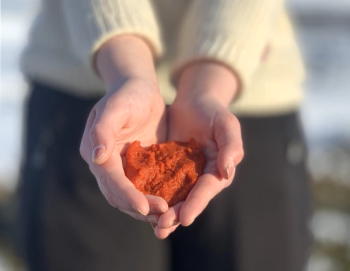
- Nutritional Outlook Vol. 17 No. 3
- Volume 17
- Issue 3
Soluble Plant Sterol: Better for Beverages
The company’s new CardioCare ingredient is a crystalline-form plant sterol that is directly emulsified.
Plant sterols can lower high cholesterol, as FDA’s approved health claim attests. However, sterols present challenges to heart-healthy food and beverages because they are very insoluble. A new company,
“Because phytosterols are nearly insoluble in water, uses in their crystalline form are very restricted, and the FDA requires a dose nearly twice that required in the form of an ester to make the FDA cholesterol-lowering claim,” says HyPhyto Inc.
Richard Staack, PhD, HyPhyto’s CEO, explains more about what makes the crystalline form so insoluble.
“The crystalline form is a nearly pure (usually 98%+) mixture of the more common phytosterols, such as sitosterol, campesterol, stigmasterol, brassicasterol. This form melts at about 265°F, and when it solidifies it is a glassy, hard substance, for all practical purposes insoluble in water.” That’s not to say that the crystalline form cannot be used in foods. Because it is soluble in fat by up to 12%-15%, it can be used in products such as shortenings and margarine-you’ll remember the shortening and margarine products on the market that touted plant sterols. Other than those foods, however, “very few foods contain enough fat to utilize [the crystalline form],” Staack says.
He says that some companies have tried to overcome these formulating challenges, to make the crystalline form more soluble,” by grinding the glassy material to an extremely fine powder (nano-particles), but this powder will not easily stay suspended in water and settles to the bottom on storage.” And, he says, there is a mouthfeel effect to this-foods may taste grittier as a result.
The ester form is another option, but as Staack points out, this option is more expensive and may not make much marketing sense.
“The ester form is made by esterifying (chemically combining) the sterols with a food-grade fatty acid,” he explains. The result is a “paste” that melts “right around body temperature.” Sterol esters are still “quite insoluble,” he says, requiring emulsification (chemically or mechanically) for use in liquid-based foods.
While the ester "paste" can be used in fat-containing foods such as margarine, high-fat baked goods, and even soft-serve ice cream, “it seems counterintuitive to put a cholesterol-reducing supplement in a high-caloric food,” Staack says.
Plus, making and purifying the ester form is a “complex and expensive process,” Staack says, “resulting in a price-per-unit used significantly higher-nearly double-than the base sterol.”
By contrast, HyPhyto's new CardioCare ingredient is a crystalline-form plant sterol that is directly emulsified. As such, it disperses easily in water.
CardioCare is suited for functional beverages like juice, flavored water, and smoothies, without altering taste, color, or viscosity and without falling out, streaking, or separating.
CardioCare’s solubility also improves its absorption in the skin, which opens up cosmeceutical opportunities. Cholesterol helps the skin retain moisture. Because plant sterols’ molecular structure is nearly identical to cholesterol’s, sterols, too, can help improve skin moisture.
Most sterol ingredients have larger particle sizes that prevent dermal absorption. CardioCare’s 300-nanometer particle sizes make it completely water-soluble so that the sterols “will easily cross the epidermal layer” in products like skin cream, the company says. There are even applications in toothpaste-because it displaces cholesterol, it may increase healthy blood circulation in the gums-chewing gum, and mouthwash.
Articles in this issue
over 11 years ago
3 Top Immune-Health Ingredients (Prebiotics)over 11 years ago
Brain-Health Food Marketers Are Missing the Senior Channelalmost 12 years ago
How Halal Certification Can Help Boost Your Dietary Supplements Businessalmost 12 years ago
Are Collagen Nutricosmetics More Effective than Topical Collagen?almost 12 years ago
Are Calcium Supplements Bad for the Heart?almost 12 years ago
Ingredient Spotlight: Honey Powderalmost 12 years ago
Glucosamine: Still Standing Strong?almost 12 years ago
Quinoa Forms: Powders, Puffs, and Morealmost 12 years ago
GMO-Labeling Laws: Why the Trigger Clause?almost 12 years ago
Black Chokeberries Are Returning to North AmericaNewsletter
From ingredient science to consumer trends, get the intel you need to stay competitive in the nutrition space—subscribe now to Nutritional Outlook.




